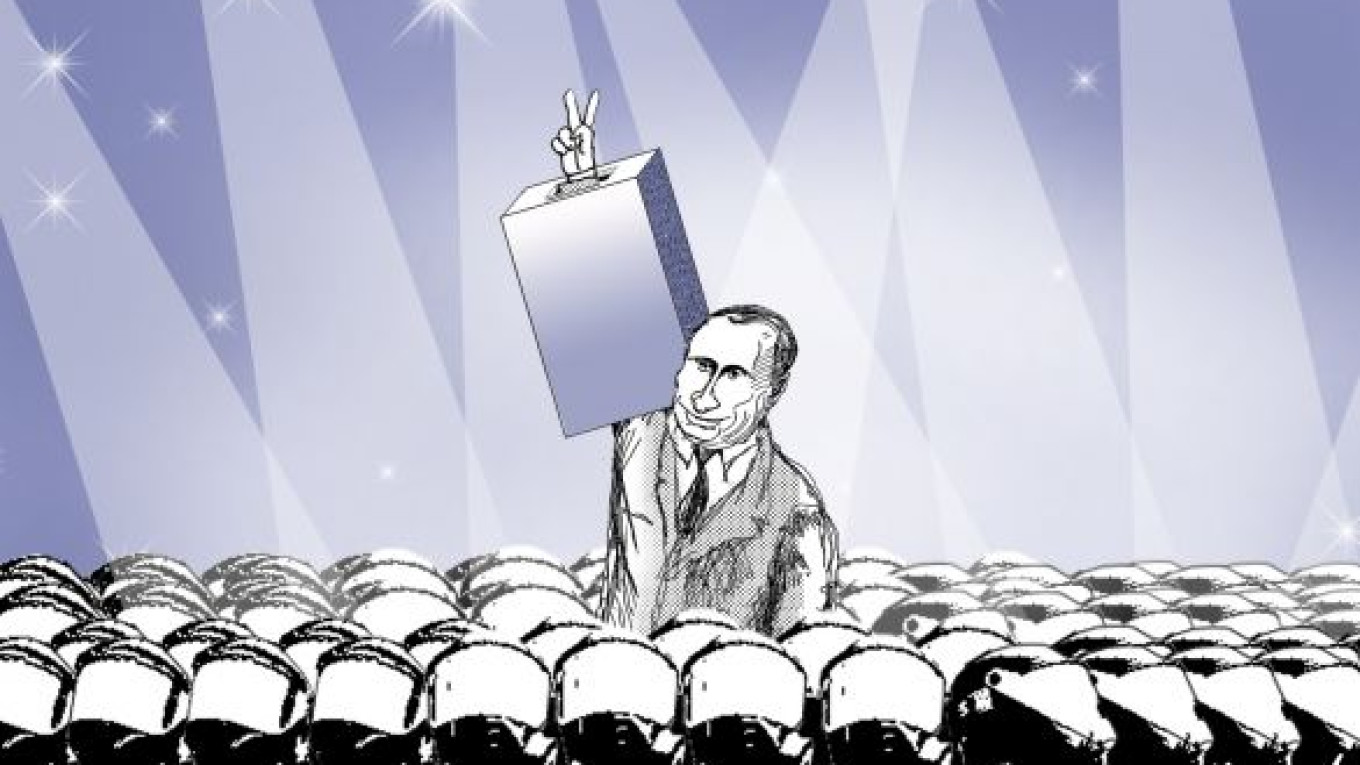At 10:50 p.m. last Sunday, with only 30 percent of the vote counted nationwide, Vladimir Putin tearfully gave his acceptance speech on Manezh Square, located a stone's throw away from the Kremlin.
He could have just as well announced the victory much earlier. "I promised you we would win and we won!" he screamed to thousands of his supporters. Given the Kremlin's firm control of the election through state-controlled media, the Central Elections Commission and other administrative resources, this was one promise Putin was able to fulfill fairly easy.
Once again, as other Kremlin leaders proved before him, it's not important how the people vote, but who is doing the counting — and who controls the entire electoral process.
Nonetheless, Putin insisted during the speech that the vote was "open and honest." Notably, he and United Russia leaders said the same thing after the December State Duma elections.
Apart from the thousands of documented allegations of election fraud during Sunday's vote and widespread abuse of administrative resources during the campaign, the biggest question is how can Putin call the presidential election open and honest when the real opposition was not allowed to run?
Putin was celebrating a victory against three hand-picked sparring partners and an oligarch in a country that hates oligarchs. This is like an adult who celebrates his victory over a 7-year-old child in a spelling bee.
So much of Putin's campaign strategy was based on the absurd premise that there are no alternatives to him. Interestingly enough, Belarussian President Alexander Lukashenko, "the last dictator in Europe," says the same thing, as did Moammar Gadhafi, "the King of Kings." Divine right is the guiding principle of virtually every autocrat.
Take, for example, one of the more popular signs at pro-Putin rallies in the weeks leading up to the election: "If Not Putin, Then Who?" — hardly a compelling reason, it would seem, to vote for the incumbent.
But what about Alexei Navalny, Vladimir Ryzhkov or Boris Nemtsov, for example? We were told that they are not real alternatives because if these "secret agents of the West" came to power, they would embezzle billions of dollars, bring Russia back to the chaotic '90s, take direct orders from Washington and destroy the country.
By Putin's logic, he was actually saving Russia by excluding the opposition from the political race. Since Russia was fighting a battle against foreign-sponsored enemies, emergency measures were justified to prevent them from coming to power. "The battle for Russia continues!" Putin shouted during his Luzhniki speech on Defenders of the Fatherland Day a week before the election, invoking images of the Battle of Borodino.
Any free and fair election requires, at a minimum, a competitive playing field with real opposition candidates, debates and an open, heated discussion of the country's most important issues. As Nemtsov said, "Give me just one hour with Putin — one-on-one in a live, televised debate — and I guarantee that he would never win another election again."
Nemtsov's trademark bravado notwithstanding, he is correct that the truth comes out in an argument. It is one thing when state-controlled television shows "documentaries" about Putin's great achievements and apocalyptic scenarios of how the country would collapse if an opposition leader ever came to power. But imagine if millions of voters saw other documentaries on an independent national television station — if there were such a thing in Russia — that revealed Putin's negligence over the past 12 years in power and well-founded allegations of corruption, cronyism and abuse of power.
Even as he announced his victory Sunday night, Putin once again couldn't resist discrediting and defaming the opposition, whose goal, he said, "is to break up the Russian state and usurp power."
Those who had hoped that the Kremlin's smear campaign against the opposition was only a pre-election tactic are in for a disappointment. As the anti-Putin protests continue, Putin will likely continue this public defamation campaign. If this tactic exhausts itself, he may need to resort to more violent, repressive methods, like the ones Lukashenko used against the opposition after his fraudulent presidential victory in December 2010 — which he also, not surprisingly, claimed was "open and honest."
We may have seen the first glimpse of this crackdown after Monday's protest on Pushkin Square when OMON riot police used unjustified force to rough up dozens of protesters, and 250 were detained. (See related comment by Andrei Soldatov on this page.)
In reality, Putin did not win on Sunday. Winners in honest, open presidential elections don't send thousands of OMON riot police, Interior Ministry troops and armored personnel carriers to protect the Kremlin and intimidate protesters. On Sunday and Monday, central Moscow looked more like it was under martial law than a city that was celebrating the return of its benevolent, irreplaceable national leader.
And Putin on Sunday looked more like a leader who was afraid of his own people — those who could have sent him packing if he had held an open, honest and competitive election and who say they will continue to demonstrate until he steps down or a new presidential election is held. This may have been the real reason for Putin's tears.
While Putin's spokesman was quick to claim that the tears were simply caused by the cold wind, many thought they were crocodile tears or a cheap, orchestrated attempt to appear sentimental after his grueling battle to win the presidency.
Whatever the reason, few in Moscow believe an autocrat's tears.
Michael Bohm is opinion page editor of The Moscow Times.


